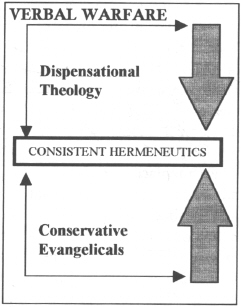A Dispensational Model: The Essentials -- By: John M. Baze, Jr.
Journal: Conservative Theological Journal
Volume: CTJ 02:7 (Dec 1998)
Article: A Dispensational Model: The Essentials
Author: John M. Baze, Jr.
CTJ 2:7 (December 1998) p. 431
A Dispensational Model:
The Essentials
Professor of Biblical Languages
Tyndale Theological Seminary, Ft. Worth, TX
Introduction
The verbal warfare continues to intensify in the aggressive debate to defend or oppose the system of theology called Dispensationalism. As with any theological system seeking to unfold the absolute truth of Scripture, the focus upon an accurate interpretation of that truth should always be the driving force of Christian scholars and theologians. In this fervent quest to fulfill the Biblical mandate to “Be diligent to present yourself approved to God as a workman who does not need to be ashamed, handling accurately the word of truth” (II Timothy 2:15, NASB),1 certain battle lines have developed.

In the modern era, the most severe attacks originate from within the specific group most recognized as the typical adherents to Dispensationalism—conservative, evangelical Christians. Liberal theologians would be the natural opponents of this system of theology since a major tenet requires a literal or plain approach to the proper understanding of the Word of God.2 But this distinctive trait is also the
CTJ 2:7 (December 1998) p. 432
major point of contention between conservative, evangelical Christians. This can be represented from a critical comment by A.W. Pink who writes that dispensationalists force (i.e., their system upon other believers):
their crudities and vagaries, and make their poor dupes believe a wonderful discovery had been made in the ‘rightly dividing of the word of truth’…How dreadfully superficial and faulty their ‘findings’ are from the popular Scofield Bible.3
Other evangelicals (who are nondispensational or have abandoned this position) also participate in this criticism with even more severity using terminology such as, “unscriptural; most dangerous heresy; an unorthodox teaching, generally espoused by heretical sects on the fringes of the Christian Church”; and “ a cult and not a branch of the Christian church”.4
One of the key points of a literal or normative interpretation that has become divisive within these evangelical groups centers upon the word consistent. There may be a general agreement of interpretation as based upon a literal approach in some of the fundamental doctrines of ...
Click here to subscribe
